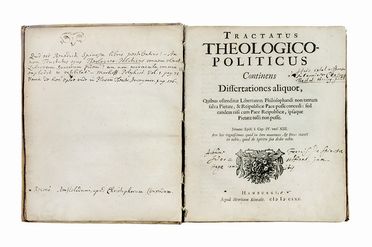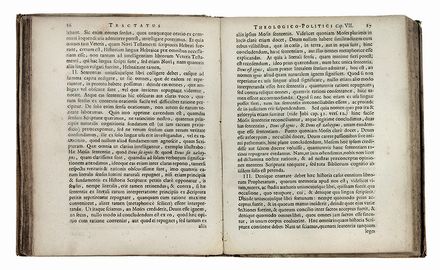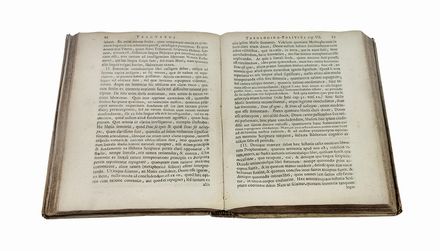Auction 13 / Manuscripts, Incunabula, Autographs and Printed Books
fri 25 OCTOBER - sat 26 OCTOBER 2013
Lot 763
Spinoza Baruch
Filosofia, Ebraica e Judaica, Religione
Tractatus theologico-politicus.
Hamburgi: Apud Henricum KŁnraht [i.e. Amsterdam: Jan Rieuwertsz], 1670.
4to (mm 200x162). Pages [12], 233, [3]. Woodcut printer's mark on title page. Few browning but good copy. Contemporary full vellum binding; spine restored. Contemporary handwritten notes through text; on inside cover label from Casa Editrice Luce e Ombra.
In-4° (mm 200x162). Pagine [12], 233, [3]. Fregio tipografico xilografico al frontespizio. Minime bruniture ma buon esemplare. Legatura coeva in piena pergamena, restauri al dorso. Note manoscritte coeve lungo il testo; al contropiatto anteriore applicata etichetta della Casa Editrice Luce e Ombra.
Prima edizione, seconda rara tiratura con la correzione del numero alla pagina 104, di questa importante opera che inaugura un genere politico-filosofico riunendo il razionalismo cartesiano con la tradizione religiosa ebraica. PMM, 153: «It constituted an extension to political thought of his ethical views. Man is moved to the knowledge and love of God; the love of God involves the love of our fellow men. Man, in order to obtain security, surrenders part of his right of independent action to the State. But the State exists to give liberty, not to enslave; justice, wisdom and tolerance are essential to the sovereign power. Spinoza's thought, a fusion of Cartesian rationalism and the Hebraic tradition in which he grew up, is a solitary but crystal-clear exposition of the theory of natural right. He defends with eloquence the liberty of thought and speech in speculative matters, and the Tractatus contains the first clear statement of the independence of each other of philosophy and religion, in that speculation and precepts of conduct cannot collide». Vedasi inoltre Ebert, 21612; Graesse VI, 469; Kingma-Offenberg, 5; Van der Linde, 3 (tiratura successiva).















